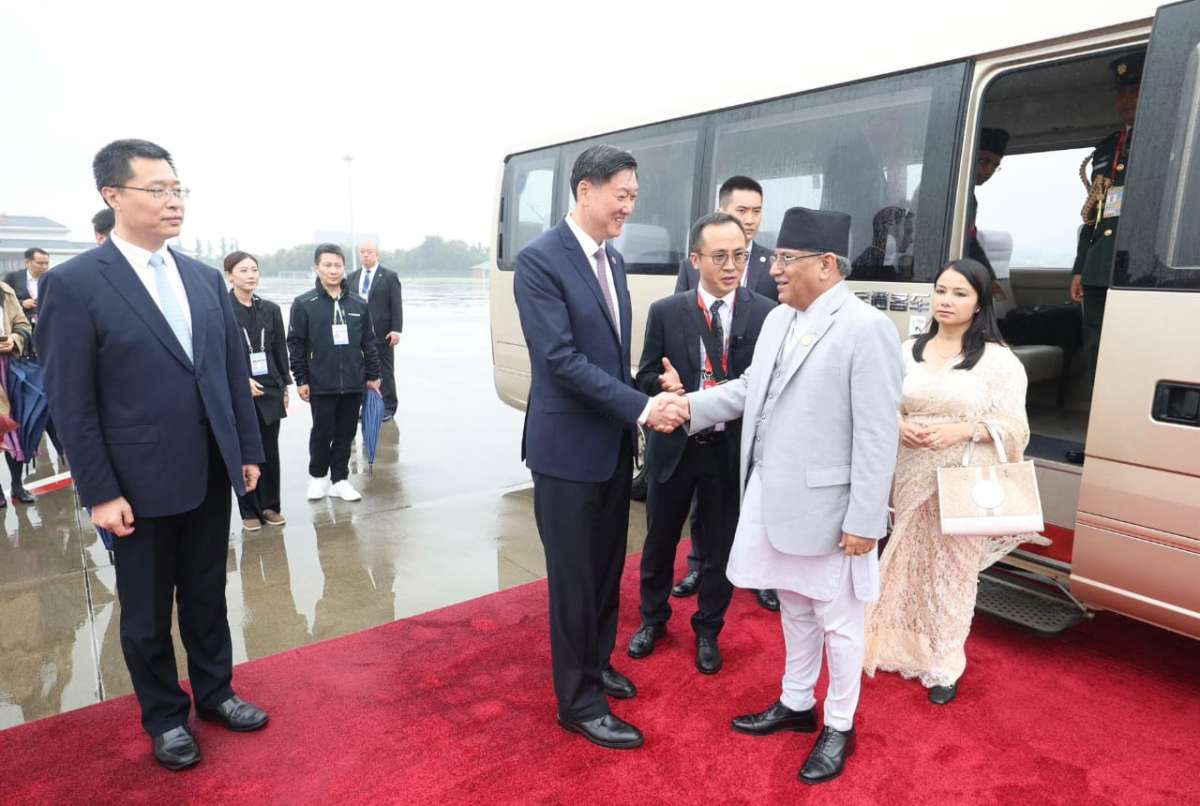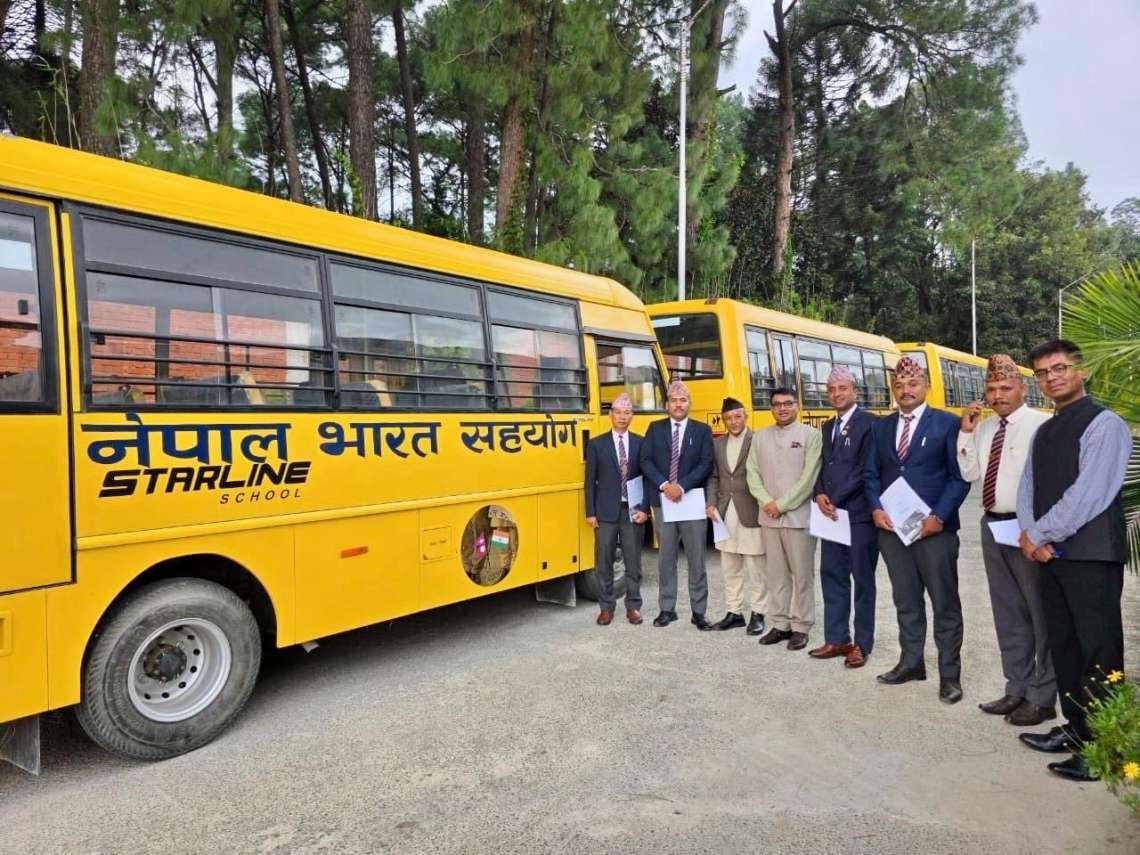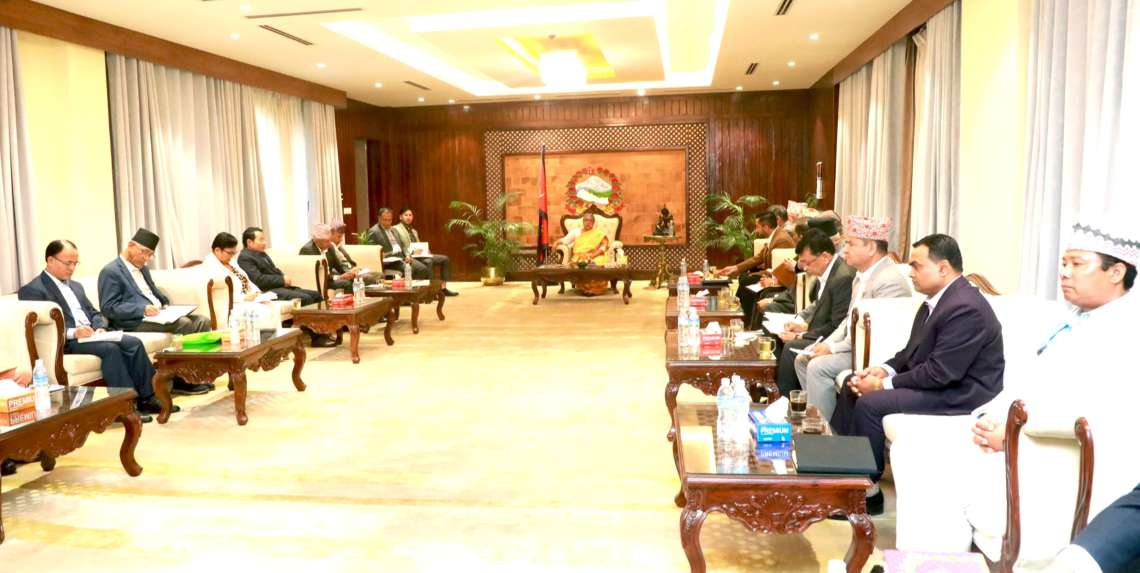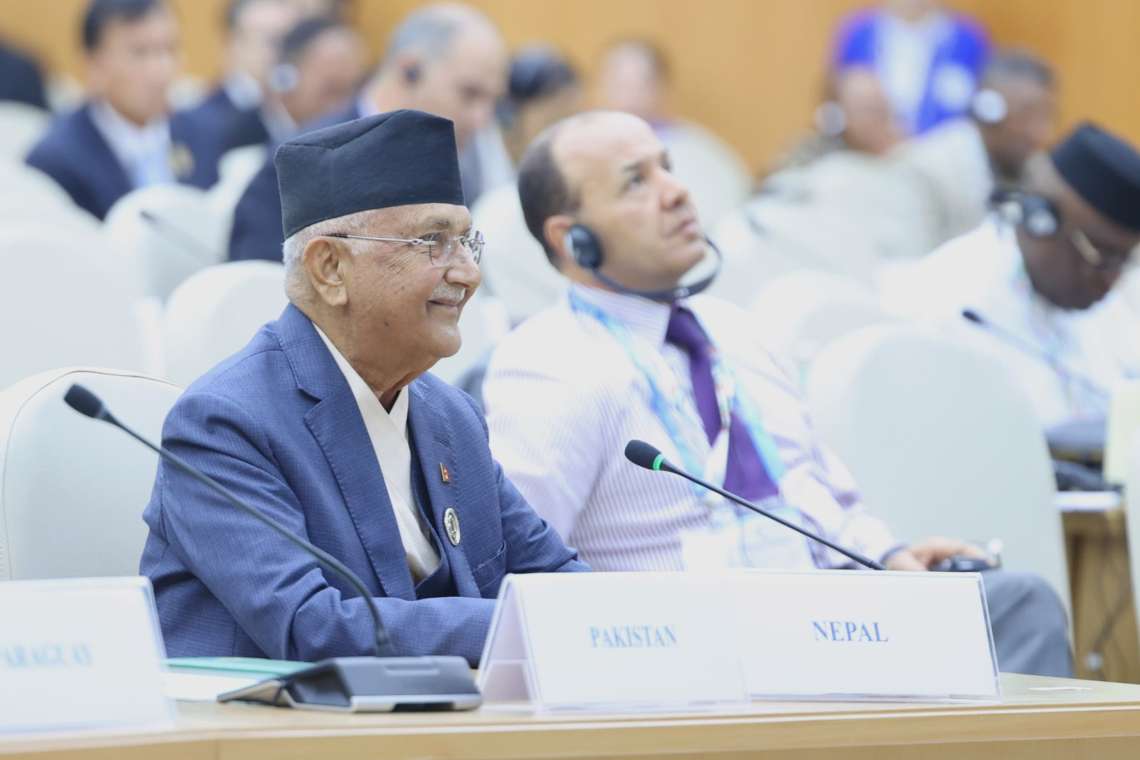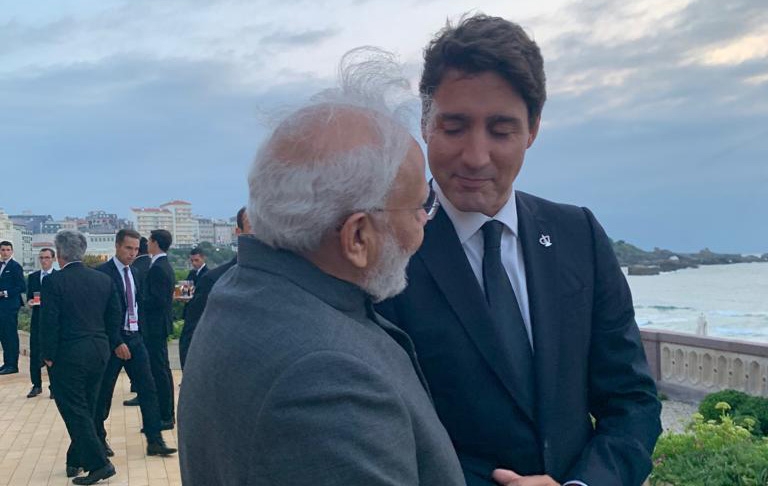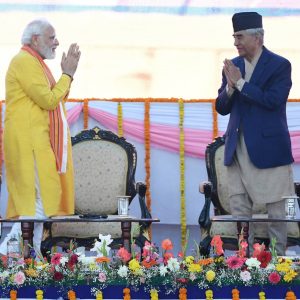Nepal faces challenges of delicately balancing ties with India and China during Nepali PM’s China visit, writes Prithvi Shrestha
Just ahead of Nepal’s Prime Minister Pushpa Kamal Dahal’s visit to China which began on Friday, Chinese ambassador to Nepal Chen Song made a controversial comment about India’s policy towards Nepal and other neighbours and downplayed Nepal’s economic relations with the southern neighbour.
His comment that India policy towards its neighbours as unfriendly and Nepal power export to India is very minimal compared to its import of power from the southern neighbour suggesting insignificance of Nepal’s export of power to India, invited strong criticism from Nepal’s lawmakers and the parliament.
But foreign policy experts in Nepal described the Chinese ambassadors’ comment as a manifestation of Beijing growing bitterness for its failures in Nepal amid Kathmandu’s warming ties with New Delhi that had soured since 2020 following both Nepal and India issued new maps incorporating disputed Kalapani Lipulek and Limpiyadhura region as their own territory.
“The Chinese ambassador speaking in that way may be the manifestation of Beijing growing bitterness over Nepal’s growing closeness with New Delhi while ties with Beijing appears to be somewhat distant,” Dinesh Bhattarai, former foreign policy advisor to then Prime Minister Sher Bahadur Deuba told India Narrative. “Chinese diplomats speaking in that way is rare, which may be a reflection of its waning influence in Kathmandu.”
Many considered the scrapping of erstwhile Nepal Communist Party (NCP) co-chaired by Former Prime Minister KP Sharma Oli and current Prime Minister Pushpa Kamal Dahal in March 2021 through Supreme Court verdict and formation of the government led by Sher Bahadur Deuba in July 2021 with the backing of former communist allies, as major setbacks to Beijing.
In another setback, the government led by Dahal formed with support from Oli’s party with the alleged blessing of Beijing was short-lived as Dahal again partnered with Deuba in February.
Dahal also skipped visiting Beijing first even though he was invited by China to participate in the Boao Forum in late March. He waited to visit New Delhi first in late May and June.
When Dahal had become Prime Minister for the first time in 2008, he had first visited Beijing, breaking the long held tradition of Nepali Prime Ministers visiting the southern neighbour first.
And, importantly, there has been no progress in implementation of Beijing’s Belt and Road Initiative (BRI) projects in Nepal. Though China claimed Pokhara International Airport built in western tourism City—Pokhara was built under BRI, Nepal government flatly rejected the claim. Nepal signed a memorandum of understanding (MoU) on BRI in May 2017.
“As the BRI implementation plan is under discussion between the two sides, no project under the BRI is yet to reach the implementation stage. I would like to clarify this fact,” Nepal’s Foreign Minister Narayan Prakash Saud said at the parliament in June.
As Beijing is suffering setbacks, its great neighbouring rival—India has marched ahead in signing and implementing various bilateral projects.
Prime Minister Narendra Modi and Prime Minister Dahal jointly carried out the ground breaking of the 400 kV Gorakhpur-Butwal transmission line when Nepali Prime Minister Dahal NHPC Limited and VUCL Ltd, Nepal signed a memorandum of understanding for the development of 480MW Phukot-Karnali project in western Nepal.
The Project Development Agreement for the development of 669 MW Lower Arun Hydroelectric Project was signed between Satluj Jal Vidyut Nigam (SJVN) and the Investment Board of Nepal (IBN). Both leaders also laid the foundation stone for the Phase-II of the Motihari-Amlekhgunj Pipeline in Chitwan. Based on understanding reached between two sides during the Dahal’s visit, officials of both sides have taken concrete steps to conclude the detailed project report of Pancheshwar Multipurpose Project, a bilateral undertaking to be developed in bordering Mahakali river.
“My impression is that the Chinese have felt bilateral relations between Nepal and China have lost their momentum to some extent,” former Foreign Minister Narayan Khadka told India Narrative. “It may be due to the fact that various Beijing funded projects are not moving ahead as expected and Beijing may have a perception that Nepal is not cooperating to develop them as expected.”
Given this context, Prime Minister Dahal is visiting China. Dahal, who has just concluded a visit to New York, to participate in the United Nations General Assembly, has arrived in Hangzhou, flying directly from New York.
Nepal’s Foreign policy experts say relations between Kathmandu and Beijing appear to not be as warm as it was a few years ago.
“Political distance appears to be growing between Nepal and China,” Sudhir Sharma, a senior journalist and author of The Nepal Nexus, told India Narrative. “I think Prime Minister Dahal will try to make efforts to reduce the political distance.”
Sharma, who is also former editor of Kantipur Daily, said that Dahal appears to be keen to implement a few notable infrastructure projects such as a cross border power line and a hydropower project with involvement of China as a part of building political trust with Beijing.
“I am not sure how much the Chinese are interested in this regard,” he said.
According to the Kathmandu Post quoting two cabinet ministers on September 16 that Nepal’s cabinet endorsed eight agreements to be signed with Beijing during his trip to the northern neighbour.
The agreement will be related to trade, commerce, energy cooperation, infrastructure, tourism, and boundary. The newspaper reported quoting the ministers that the agreements would be signed for the construction of the Tokha-Chhahare tunnel project, two agro-industrial parks, use of Chinese technology in the education sector, construction of Rasuwa-Kerung cross border transmission line among others.
Before Dahal’s trip to New York, a senior official of the energy ministry told India Narrative that agreement on development of proposed 454 MW Arun-Kimathanka Hydroelectric Project to be developed upstream of Arun river in eastern Nepal,was uncertain.
The project is owned by Vidyut Utpadan Company Limited (VUCL), a government entity. The ministry had earlier proposed to the foreign ministry for development with joint investment from Nepal and China, according to the ministry official.
“I think the Prime Minister wants to implement one or two mega infrastructure projects with Chinese investment under BRI to balance relations with India,” said Vijay Kant Karna, former Nepali ambassador to Denmark and a close observer on Nepal’s foreign policy. “But coalition partner—Nepali Congress appears to be against developing the BRI projects with Chinese loans which might be available at higher interest rates.”
Nepal has not so far taken commercial loans either from bilateral donors or multilateral donors such as the World Bank and Asian Development Bank though its International Development Cooperation Policy-2019 has opened the door for the government to take commercial loans too for the projects that give high yields.
According to the officials, Nepal government has granted the National Planning Commission to coordinate among the line ministries to finalise the draft of BRI Implementation Plan. “In fact, the Finance Ministry and Foreign Ministry are the competent authorities to negotiate and finalise the BRI Implementation Plan but the task was given to an unrelated agency,” said Karna. These two ministries are headed by the Nepali Congress leaders and the Nepali Congress Party has been expressing reservation on the current draft. “But the Prime Minister appears to be desperate to conclude the draft and sign a few deals with China related to BRI,” said Karna.
India has not opposed the BRI formally in principle but has opposed it because the China-Pakistan Economic Corridor being implemented under BRI, passes through the Pakistan occupied Kashmir, which New Delhi says is the usurpation of its territory.
Nepali foreign policy experts say that India will have a lot of concerns about the infrastructure projects that Beijing wants to develop in Nepal. It is even more so given the soured relations between the two neighbouring giants following the Galwan Valley clashes in May 2020, they said.
For example, the Chinese side is conducting a detailed feasibility study of Kerung-Kathmandu Cross Border Railway. The two countries also reiterated their commitment to extend cooperation on Kathmandu-Pokhara-Lumbini Railway Project, according to the joint statement issued after the Chinese President’s visit to Kathmandu in October 2019.
“It is obvious that India will be concerned if the Nepal-China Cross Border Railway reaches Lumbini or Raxaul,” a former Foreign Ministry official told India Narrative. “Besides physical infrastructure, Indians are also concerned about China’s involvement in information technology infrastructure in Nepal in the context of possible cyber-attacks from the adversary country.”
Former Foreign Minister Khadka said that Nepal has to take the security related sensitivity of both India and China while dealing with two neighbours. “They may not have expressed their security concerns publicly but we have to understand from indications they make,” he added.
Southern neighbour has been refusing to buy electricity generated by power projects developed with involvement of any Chinese elements such as investment or contractors from Nepal. Nepali officials say that it was the strategic decision of India even though the southern neighbour has promised to buy as much as 10,000MW of electricity from Nepal in the next 10 years.
Nepal has long been struggling to balance competing interests of India and China, who have emerged as rivals politically and strategically but trade between two neighbours has continued to remain colossal.
“Historically, Nepal has always been under the shadow of cold war particularly between India and China because of the geopolitical location of Nepal,” said Bhattarai, former foreign policy advisor to then Prime Minister Deuba.
In his book recent book “Non-Alignment, quest for an independent foreign policy,” Bhattarai writes, the cyclical turn of India-China relations, shifting from cooperation to competition, then to conflict, and eventually to accommodation, to reconciliation, alongside the similar pattern observed in US-China relations, has exerted a profound influence on their respective relationships with Nepal.”
“However, Nepal’s own relations with these nations have remained amicable, as Kathmandu has successfully built friendly relations with all three.”
He further writes, American policy toward Nepal has begun to reveal “more Chinese factors,” and Chinese engagements in Nepal have begun to expressly demonstrate their concern over a growing American presence in Nepal aimed at China.
Despite China’s apparent protest against the Millennium Challenge Corporation (MCC) Compact Programme, Nepal’s parliament ratified the MCC Compact in February 2022 whose implementation has begun from late August this year.
“China tolerates Indian presence in Nepal to a greater degree considering India’ geographical proximity with Nepal,” said Bhattarai. “The Chinese are now beginning to feel that Indian and western powers are coming up together to challenge China in Nepal. Thats why, China made unusual comments on the run of the MCC Compact ratification by Nepal’s parliament.”
Nepal is currently balancing these three powers. Historically though, Nepal has always been balancing relations with India and China.
“Nepal has played a dynamic role as both preserver and transmission of cultural and intellectual phenomena in the Himalaya area. This role Nepal played for more than two millennia,” Leo E. Rose, a US academician in his book Nepal: Strategy for Survival, published in the early 1970s. “Contemporary Nepali elites are fully cognizant of this brilliant tradition and are eager to maintain Nepal’s status as a bridge between South and East Asia.”
But Nepal is increasingly facing pressure to choose sides amid strained relations between two neighbouring countries, according to experts.
The Chinese ambassador publicly called for Nepal to align Nepal’s economic structure with that of China.
Many experts have been calling for balanced relations with both neighbours. According to Author Rose, non-alignment assumed by Nepal’s then king Mahendra is in fact to treat China and India on the basis of absolute equality.
But Former Foreign Minister Khadka said that a complete balance in relations would not be possible as Nepal has greater cultural and people to people relations with India and Nepal enjoys greater connectivity with the southern neighbour too.
“We have to be mindful of their sensitivities and should not allow Nepali soil to be used against both neighbours,” said Khadka.
Journalist and Author Sharma also called for dealing with two neighbours separately. “We have to keep Nepal’s interest at the centre while dealing with both neighbours instead of balancing relations,” he said.
(India Narrative)


